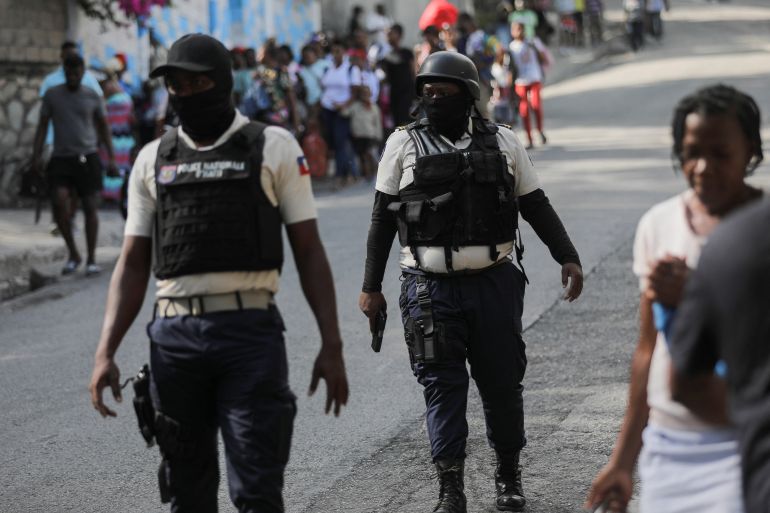Scepticism, uncertainty, hope: Haitians react to possible Kenya-led mission
People in Haiti express doubts over potential multinational force but say country can’t fight gangs on its own.

Haitians have expressed scepticism over Kenya’s offer to lead a multinational force to help the Caribbean nation respond to months of surging gang violence, questioning whether another international mission would bring more harm than good.
Many people in Haiti said the sexual abuse and a devastating cholera outbreak that have accompanied foreign forces in past decades fail to inspire much trust – but they also said ongoing bloodshed in their country leaves them with few other options.
Keep reading
list of 3 itemsUS orders non-emergency personnel to leave violence-hit Haiti
US to introduce UN resolution for multinational force in Haiti
“It will never be better [than past interventions], but the Haitian people don’t have a choice at this point,” said Florence Casimir, an elementary school teacher.
She told The Associated Press news agency that while past international interventions have damaged the country, their abuses don’t compare to the brutality of Haitian gangs, which kidnap her students and force parents to pay hefty ransoms.
“The Haitian people can’t fight it on their own.”
Haitian Prime Minister Ariel Henry made an appeal to the international community in October to establish a “specialised armed force” in Haiti, which has been plagued by political instability and rising violence for years.
He made the request as armed groups vying for control in the capital, Port-au-Prince, were maintaining a weeks-long blockade on the city’s main fuel terminal, leading to widespread shortages and malnutrition and forcing healthcare facilities to close.
While Henry’s call enjoyed support from the United Nations and the United States, Haitian civil society groups immediately cautioned that a new foreign intervention could end up repeating the mistakes of past deployments.
A UN peacekeeping mission from 2004 to 2017 was plagued with allegations of mass sexual abuse, including claims that peacekeepers raped and impregnated girls as young as 11.
In 2010, sewage run-off from a UN peacekeeper camp into the country’s biggest river started a cholera epidemic that killed nearly 10,000 people.
“They left a bitter taste in the mouths of the Haitian people,” Valdo Cene, who sells cooking gas, told AP. “Bringing in international forces could mean repeating our history.”
But last weekend, Kenyan Foreign Minister Alfred Mutua said the East African country was considering whether to lead the “multinational force” to Haiti and was ready to deploy 1,000 police officers to help train and assist Haiti’s police to restore order.
Mutua said in a post on social media that Kenya’s “proposed deployment will crystalize” once it gets a mandate from the UN Security Council “and other Kenyan constitutional processes are undertaken”.
The minister also said that a Kenyan police team would undertake an “assessment mission” in the coming weeks to “inform and guide the mandate and operational requirements” of a mission to Haiti.
Kenya’s announcement was welcomed by the UN and US, with Washington saying this week that it planned to introduce a resolution at the Security Council in the near future to authorise the force’s deployment.
“We commend the Government of Kenya for responding to Haiti’s call and leading a multinational force to assist Haitian police in restoring security,” US Secretary of State Antony Blinken said on social media. “We call on Haitian stakeholders to urgently broaden political consensus to restore democratic order as soon as conditions permit.”
On Tuesday, Henry said he spoke with Kenyan President William Ruto about the upcoming Kenyan assessment mission to the country.
Henry also said he thanked Ruto on behalf of the Haitian people for Kenya’s “brotherly solidarity” in saying it would lead the potential mission.
We commend the Government of Kenya for responding to Haiti’s call and leading a multinational force to assist Haitian police in restoring security. We call on Haitian stakeholders to urgently broaden political consensus to restore democratic order as soon as conditions permit.
— Secretary Antony Blinken (@SecBlinken) August 1, 2023
‘People are puzzled’
The international force would not be a UN force, so if deployed, Kenyan police would be in charge rather than answer to a UN force commander as they would be required to do in a UN peacekeeping mission.
That has raised some alarm among watchdog groups, which have raised questions about the human rights track record of police in Kenya, saying the force may export its abuse.
Kenyan police have been long accused of killings and torture, including gunning down civilians during country’s COVID-19 curfew. One local group said officers fatally shot more than 30 people during protests in July, all of them in Kenya’s poorest neighbourhoods.
Louis-Henri Mars, head of the Haitian grassroots peacekeeping organisation Lakou Lape, echoed those concerns. “People are puzzled about this,” Mars said. “It may become just another big mess.”
While Mars is among many who said a Kenyan force would be an important step in stabilising Haiti, he expressed hope its deployment will be a temporary effort that paves the way to a longer process of untangling rampant violence in the country.
Others, like cellphone repairman Jerthro Antoine, said Kenya’s police can’t come soon enough. He said he dreams of once again setting foot on one of Haiti’s beaches but the violence has gotten so bad that even walking on the street is a risk.
“I feel trapped in my home. Any foreign force in support of Haitian police is more than welcome,” Antoine said. “The Haitian people need it, we need a break and to have a life again.”